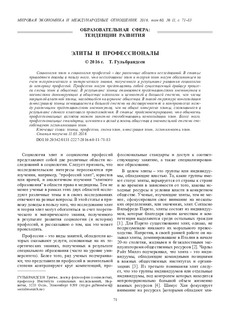Элиты и профессионалы/Elites and professions
Journal article
Published version
Permanent lenke
http://hdl.handle.net/11250/2482385Utgivelsesdato
2016Metadata
Vis full innførselSamlinger
- Publikasjoner fra CRIStin [715]
- Tidsskriftpublikasjon [388]
Originalversjon
10.20542/0131-2227-2016-60-11-71-83Sammendrag
Sociology of elites and sociology of professions are two different fields of sociology. Admittedly, there are overlapping research interests as in studies of “elite professions”, for instance lawyers or medical doctors, or similarly studies of “elite educations” within law and medicine. Nonetheless scholars within these two fields are primarily engaging themselves in different topics and research questions. In this article I argue that particularly elite research and elite theory can benefit from theories and empirical knowledge developed within the sociology (and history) of professions. The argument is worked out theoretically by presenting three main areas within elite sociology and identifying some significant issues within these areas. Then I discuss how the sociology of professions can help throw light on these issues, illustrated by empirical examples. The three areas within elite sociology that I focus upon are: (1) elite circulation, (2) elite integration or cohesion, (3) elites and legitimacy. Professions are collective actors which actively attempt to carve out occupational domains reserved for their members. At the same time professions frequently aim at obtaining a collective uplift of status. The collective endeavors of the professions may influence the elite structure of a particular society. They may establish new elite institutions and organizations, new elite positions and new routes to elite status. In other words, professions may be significant drivers in the elite circulation in a society. Secondly, professions develop basic mentalities, ideas and values which impinge upon the institutions and organizations in which they are dominating. As a result elites become representatives of their institutions and their basic mentalities and values rather than members of a closed power elite on the top of society. In such an elite structure elite integration is more about accommodation and compromise between the various institutional representatives than common interests due to same class background. Moreover, professional standards, values and contributions to a large extent have become the underpinnings of elite legitimacy.
